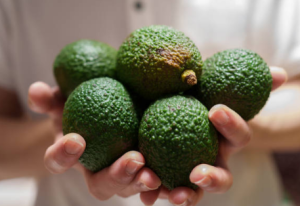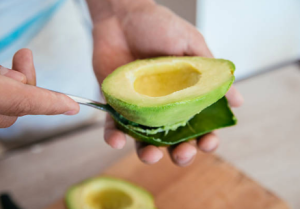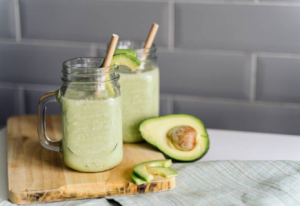No matter which healthy eating principles you follow, avocados can be a staple superfood. It’s no secret either, according to the USDA, avocado consumption in the U.S. has tripled since 2001, and the average American now eats 8 pounds of avocados per year.
So, what exactly are the benefits of avocados? Here’s what this fruit (yes, it’s a fruit!) does for your gut, skin, and overall health.

Benefits of Avocados
Avocados are rich in healthy fats, vitamins, and minerals that can support our overall health in several key ways.
1. They support heart health.
Avocados contain a phytonutrient called β-sitosterol, which has been shown to help maintain healthy cholesterol levels.
β-sitosterol is a plant sterol that is structurally similar to cholesterol and lowers cholesterol levels in the body through the hepatobiliary system (through excretion).
Avocados contain very healthy fats: monounsaturated fatty acids (MUFAs) and polyunsaturated fatty acids (PUFAs). Both MUFAs and PUFAs can lower LDL levels (bad cholesterol) in the blood
2. They promote a healthy gut.
You may not associate avocados with fiber, but they contain a fair amount of fiber. A medium-sized avocado contains 3.4 grams of fiber, which accounts for between 9% and 16% of our daily fiber needs. Whole dietary fiber can produce a diverse and robust microbiome. The healthier our gut bacteria are, the healthier we are.
A healthy gut and plenty of fiber can guarantee regular bowel movements – an important part of the body’s detoxification system.

3. They moisturize and nourish the skin.
Most fruits contain a lot of sugar, which is quickly digested by the body. Avocados, however, are different in that they contain a high content of oleic acid, the same fatty acids found in avocado oil and olive oil. Oleic acid has a variety of health benefits, but one of the big benefits has to do with skin health.
The skin is a metabolically active organ, which means it can use fatty acids such as oleic acid to lock in moisture.
4. They can help reduce inflammation in the body.
Avocados are rich in anti-inflammatory compounds like carotenoids, vitamins C and E, and phenolic compounds. All of these substances have been shown to protect against oxidative damage and chronic disease while improving cognitive function.
Oleic acid also plays a role here. Previous studies have found that oleic acid-rich diets have a positive effect on fighting inflammation-related diseases and activate pathways for certain immune-boosting cells.
Avocados are also a great source of α-linolenic acid (ALA), an essential omega-3 fatty acid. Preclinical studies have shown that ALA can reduce inflammatory pathways in models of gastrointestinal diseases such as colitis and have neuroprotective effects.
5. They can help you maintain a healthy weight.
Avocados are often touted as a food that can help people lose weight, especially belly fat. But can eating avocados really maintain a healthy weight?
Not exactly. While avocados don’t burn fat directly, they are a good source of nutrients to support weight loss or maintain weight. The high fat and fiber content in avocados can help people feel fuller, which can help regulate appetite. We know that people who eat fiber-rich foods like fruits and vegetables tend to maintain a healthier weight than people who don’t.
A study published in the Journal of the American Heart Association helped to bust the myth of belly fat. Subjects were divided into two groups: one group ate one large avocado a day for six months, while the other group did not change their diet. After six months, the researchers found no difference in abdominal fat between the two groups. However, the group that ate avocados daily did have a decrease in total cholesterol and LDL cholesterol.
This proves an important point: there is no silver bullet when it comes to nutrition. Eating avocados, but doing 10 other things in your daily life that cause high cholesterol and extra belly fat, may not get the results you want.

6. They can enhance eye health.
Perhaps this is an unexpected benefit of avocados, which are rich in two carotenoids: lutein and zeaxanthin. These two phytochemicals are found in eye tissue and help prevent eye damage, such as those caused by UV rays.
The carotenoids in avocados are especially important because of their intrinsic absorption benefits – the intrinsic fats in the fruit help enhance the bioavailability and absorption of these fat-soluble carotenoids.
7. They may help to normalize blood pressure.
People with high blood pressure may wish to eat more avocados in their diet. Avocados have been linked to lower high blood pressure, and avocados are rich in potassium, which relaxes the walls of blood vessels.
How many avocados should you eat per day?
One reason to love avocados is that they are very versatile: you can eat avocados in avocado sauce, spread them on a slice of toast, add them to smoothies for a creamy flavor, or garnish them as a garnish for omelets, salads, or peppers.
Studies have even found that eating avocados with other whole plant foods can help increase the body’s absorption of phytonutrients such as β-carotene, lycopene, lutein, and zeaxanthin.
As a general rule of thumb, experts recommend sticking to half an avocado as a standard serving size with a meal or as a snack. Avocados are especially beneficial if you follow a ketogenic diet or a Mediterranean diet pattern because they contain a nutrient profile of healthy fats. For most people, eating one avocado a day is very healthy.





